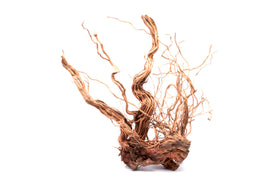
Fenestratarum Mulyadii
Sold out
Original price
$ 12.99
-
Original price
$ 39.99
Original price
$ 12.99
$ 12.99
-
$ 39.99
Current price
$ 12.99
Fenestratarum Mulyadii is a newly discovered genus that is closely related to Aridarum, Piptospatha, and Bucephalandra. Fenestratarum Mulyadii offers visual characteristics that are similar to the popular Bucephalandra species Buce Belindae and Buce Catherinae, but with longer, more slender leaves that slightly ruffled, deep green in color and slightly leathery to touch. Curves in its leaves are more pronounced and sprout more closely together from its thicker, central rhizome. The current sizing observed is around 6-inch leaves in length.
It can be safely assumed that growth is slow and care is similar to Bucephalandra, Aridarum and Piptospatha species. Care requirements include low to medium lighting, quality aquarium plant fertilizer, CO2 injection if possible and consistent aquarium maintenance. Available in both plant and clump portions. Please note that clump portions are much larger in size and quantity.
Notes:
- Fenestratarum Mulyadii is an epiphytic aquarium plant so it can be attached to aquarium hardscape.
- Fenestratarum Mulyadii is extremely rare and little is known about this particular species. We recommend it for aquarists with experience keeping Bucephalandra, Aridarum and Piptospatha species.
- Do not plant this aquarium plant in the substrate and cover the rhizome. This will cause it to melt and rot.
- Final size, coloration and growth rate are dependent upon the condition of the aquarium Photos are a representation of what you will receive and may vary.
- Do not make drastic changes to the aquarium. Unstable parameters will result in melt and rotting of the aquarium plant.
- CO2 injection will yield better growth.
- Please be sure to remove this plant from its pot. Remove the rockwool surrounding the roots and attach to hardscape. For instructions on how to properly prep "potted" aquarium plants, click here.
Family Name: Araceae
Endemic To: Borneo, East Kalimantan Timur
Leaves: Curly, long leaves
pH: 6-8
Care: Easy
Light: Low to Medium
Co2: Not necessary but recommended
Propagation: Cut by rhizome
Growth rate: Slow









